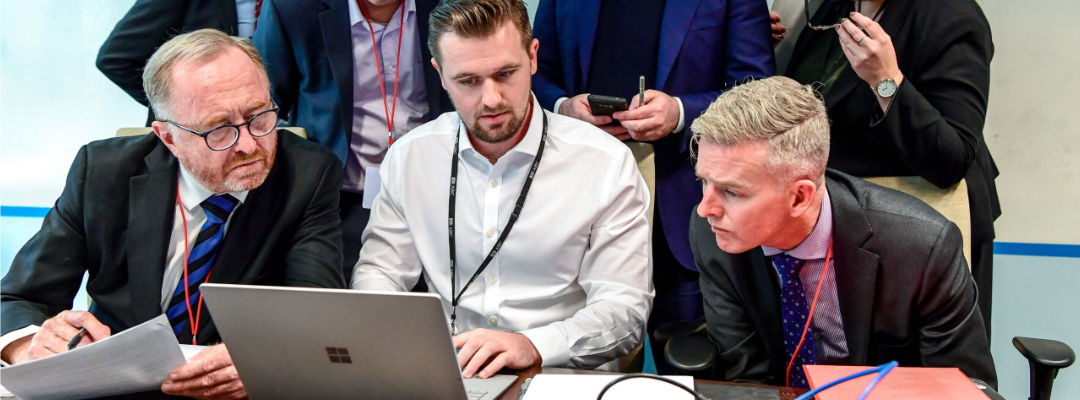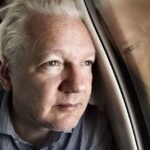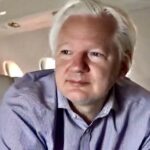Update: Since this article was finalised, two portentously grave events have occurred. On Sunday (12 Dec) it was publicly revealed that Julian Assange has suffered a mini-stroke. Journalists observing via video link, during the first day of the High Court appeal hearing on October 27th, noticed he had a drooping eye, and appeared confused and unwell. He has since been assessed as having had a ‘transient ischaemic attack’ and is now taking anti-stroke medication. Stella Morris, his partner, fears this mini-stroke could be ‘the precursor to a more major attack’, and said today: ‘It compounds our fears about his ability to survive the longer this long legal battle goes on.’ On Friday night (10 Dec), the US won an appeal in the High Court against the UK’s refusal to extradite Julian Assange to the US to face trial over the unprecedented ‘espionage’ charges. While the decision is yet to be formally confirmed, it puts the Australian journalist one foot closer to a possible 175 year prison term – if he survives.
When supporters of imprisoned journalist and publisher Julian Assange called to the world’s journalists to take a stand for him and his right to free speech because otherwise they’d be next, most didn’t believe them.
But then in two consecutive days in June 2019 the Australian Federal Police raided the home of a News Corp journalist in Canberra, and the headquarters of the ABC in Sydney. Three journalists were in the gun – News Corp’s Annika Smethurst, and the ABC’s Dan Oakes and Sam Clark. They were being investigated for publishing leaks about new unlawful domestic spying plans and Afghan war crimes. Following the raids they faced potential jail sentences for allegedly breaching Australia’s national security laws.
These steps by the AFP signalled a new intolerance by the Federal Coalition government of whistleblowers and the journalists that receive and publish matters of state – unless of course the stories were ‘official’ leaks, made by government sources and given to tame journalists.
The outcry against the raids was immediate. For a rare brief moment of unity, every significant news organisation in the country put competitive instincts aside, formed a public ‘Right to Know’ campaign, and opposed the raids, calling loudly for legislation to enshrine protections for a free press.
In a blistering speech to that year’s Walkley Award ceremony, veteran ABC journalist, Kerry O’Brien, made a call on all Australian journalists to support Assange and the press freedom values for which he stands. In doing so, he raised the spectre of ‘fascism’ as a threat to Australia if the extraordinary attacks on press freedom are continued.
‘Freedom is usually eroded gradually. It might happen over years, even decades. Its loss is not necessarily felt day by day, but we will certainly know when it’s gone,’ he said. ‘Authoritarianism unchecked can lead to fascism…We’re a long way from that yet, but a study of history amply demonstrates how fascism begins.’
O’Brien reminded the hundreds of gathered journalists that, as they sat celebrating with champagne in hand, fellow-Walkley Award winner, Julian Assange, was ‘mouldering in a British prison, awaiting extradition to the United States, where he may pay for their severe embarrassment with life in prison.’
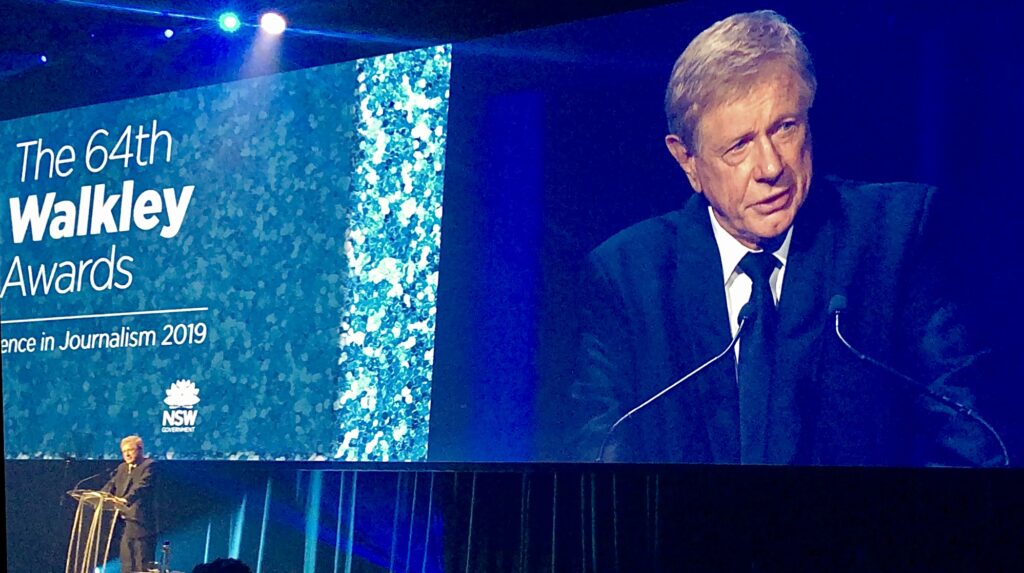
‘The Walkleys recognised that his actions with WikiLeaks were the actions of a journalist, and he was awarded for it,’ O’Brien, the chair of the Walkley Foundation, said to a national television audience earlier that year on the ABC’s QandA.
‘I do think that it is incredibly important for journalists, no matter how you might feel about the individual, that there are principles at stake here, that are incredibly important.’
The Walkley Award citation given to WikiLeaks with editor-in-chief Assange, made his work as a journalist fundamentally clear when it declared: ‘This year’s winner has shown a courageous and controversial commitment to the finest traditions of journalism: justice through transparency.’
Australia’s political leaders in 2010 before Assange was charged with any alleged crime, parroted the statements of the US administration describing what Assange had done as ‘illegal’. They maintained a pregnant silence when the Federal Police investigation into Assange found he had committed no crime under Australian law. One of Australia’s most respected veteran journalists was so incensed by these politicians, that he tore them a new one.
Laurie Oakes was a political journalist with Nine and News Corp who made his reputation reporting important leaks that were vital to Australia’s democracy, leaks about illegal wars and political skulduggery. On the night he was presented the country’s premier journalism award in front of a pavilion packed with journalists, he spoke out: ‘To brand what the Wikileaks site has done as illegal … was, I think, demeaning of our government. And, as journalists, we should make it clear that is our view.’
‘Whether it’s a letterbox full of classified cables, or a quarter of a million on a CD, the principle is the same, and we should fight for the right to do that.’
A journalist who’s been following closely the ongoing court case in London against Assange, is Mary Kostakidis, a former senior journalist and presenter from SBS TV. She says the US Justice Department prosecutors have admitted in court that the case has become a precedent for future prosecutions of journalists.
‘The judge asked the prosecutor… “would a newspaper ‘obtaining’ classified information be enough to constitute conduct deemed an offence?”. After some prevaricating the answer was “yes”,’ said Kostakidis.
Despite this direct warning to journalists of the world, few in the mainstream reported this development. ‘There it was, loud and clear, but it fell on deaf ears. The prosecutor has on numerous occasions stated “The US has never said they will not prosecute journalists”,’ she said.
‘This war on journalism is an element of the rise in authoritarianism in countries that in the past championed press freedom, but can no longer claim to do so. We are seeing it right here. The Australian government has legislation in place to prosecute journalists.’
Last year another respected veteran ABC journalist, Andrew Fowler, lamented the destruction of Julian Assange’s way of holding truth to power through ‘scientific journalism’ that published entire troves of documents, with redactions, so the public could see the truth unvarnished. ‘WikiLeaks was a counterweight to the rising intrusiveness of the surveillance state. It would be expected that the US in particular would try to smear his name.’

(Photos: Univ Sydney; New Daily; WSWS.org; Wheeler Centre, Hachette Australia)
‘What at times was disheartening,’ says Fowler, ‘was to witness the relish with which journalists, who had previously greeted him with open arms, turned on him. Many of these journalists saw themselves as part of the ruling elite, not representatives of the voiceless, the unrepresented in society.
‘What Assange is charged with doing is what every journalist should be doing every day – encouraging sources to leak, helping them protect themselves, exposing evidence of war crimes.
‘What WikiLeaks and Assange did more than anything else, was to dare challenge authority, and particularly the authority of the world’s then sole super-power. In a world where countries are increasingly moving closer and closer to authoritarianism, those who stand against authority are to be crushed. There will be no dissent. It is why he is in the dock at the Old Bailey.’
Another respected and experienced former-ABC journalist, Quentin Dempster, took the criticisms of Assange head-on. ‘Some journalists in Australia, initially supportive of Assange and WikiLeaks, believe he is not a journalist, but some sort of anarchist,’ he said.
‘They were particularly moved by the [unsubstantiated] complaints of US presidential candidate Hillary Clinton, that Assange and WikiLeaks had become a ‘tool’ of the Russians. But Assange is not being pursued over the so-called Clinton emails. He is being extradited over what became known as the Chelsea Manning revelations [the Afghan and Iraqi leaks].’
Dempster asked whether the WikiLeaks modus operandi of soliciting and publishing a nation’s embarrassing or illegal intelligence secrets, even with WikiLeaks’ pre-publication authentication and source protection, was ‘real journalism’.
‘It is undoubtedly journalism if it tells the world and a nation’s public what is really going on… The imperative is the public’s right to know – particularly when our young defence force men and women are to be placed in harm’s way, often on the intelligence assessments of a nation’s security agencies.
‘All the issues that so concern us about our democratic freedoms, are being tested through the extradition proceedings against Julian Assange.’ Dempster said. ‘And if at the Old Bailey, Assange is extradited to the United States to be jailed for life for informing us about war crimes, misjudgements, incompetence and atrocities, we democracies will be destroying our own professed values.’
Visceral fear is the reason many journalists have steered clear of reporting on Assange’s case, writes SMH-Nine journalist Elizabeth Farrelly.
‘Fear in particular of confronting the terrifying truth about our imperial system. Regardless of Assange’s innocence or guilt, the simple facts of what our controlling powers can do to you if you step out of line are terrifying.’ Farrelly says this personal fear ‘also operates, very effectively, at nation level’.
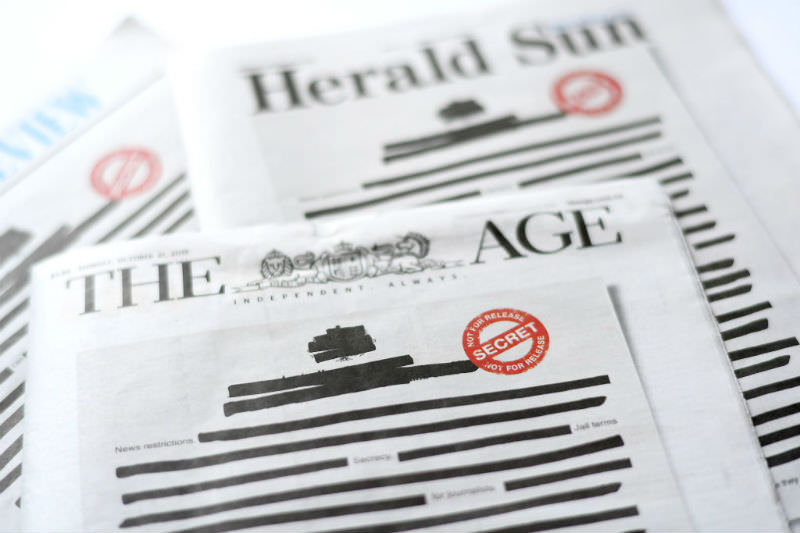
‘Certainly Australia’s persistent refusal to intervene for Assange, an Australian citizen who has broken no Australian law, suggests a similar abject timidity in the face of US might.
‘This is cowardice. It’s yielding to a fear we feel but rarely confront: the existential fear that at some lofty level, morality doesn’t apply. Up there in the imperial military-industrial complex, justice, freedom, truth are only words. Up there it’s a whatever-it-takes kinda world. The bad guys are in charge,’ says Farrelly.
‘That’s the fear that guys like Assange and Edward Snowden make us confront. And it’s why they deserve, at the very least, a fair and open trial.’
Too many timid or careerist Australian journalists have remained silent. But many others have spoken out supporting calls for real justice and the release of Assange. Many have reported stories that point to the injustice and risks for us all. Many more had hoped that the ‘Right to Know’ campaign that followed the police raids on the ABC and News Corp journalists would have resulted in improved protections for journalists in Australia. But the campaign hasn’t had that result. No Media Freedom legislation has been enacted, nor do we have a Bill of Rights enshrining press freedom, freedom of expression, and human rights.
The arrest and jailing of Australian journalist Julian Assange – who has never even worked in the US – on trumped-up charges of breaching US espionage laws, is unprecedented in the history of Western journalism. The recently revealed CIA plot to murder him has shown the seriousness of the efforts to silence him, and his WikiLeaks supporters. If he is determined by a UK court to be able to be extradited to the USA, he will be tried there and likely jailed for the rest of his life. If this is done, it will become a precedent that will undoubtedly be used against journalists world-wide.
Australia remains perched at a curve in the road, on a pathway to authoritarianism. As new ‘national security’ laws get regularly legislated into existence, they expand already extensive surveillance and policing powers. This is serving to further criminalise journalism and whistleblowing. Despite the noise and bluster of the media’s campaigning, press freedoms have not been protected, whistleblowers are still persecuted, journalists remain vulnerable, and Julian Assange remains in jail. Clearly it remains valid to ask: ‘who’s next?’.
